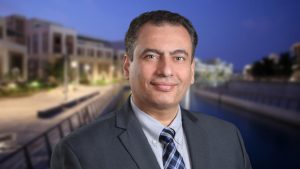A professor at King Abdullah University of Science and Technology in Saudi Arabia who once served as a dean at the Stevens Institute of Technology in the United States, has received expressions of concern on 93 of his conference proceedings for what a publisher said were irrelevant self-citations and “artificially inflating the number of citations.”
The notes by the Institute of Electrical and Electronics Engineers (IEEE) on the work of Yehia Massoud, a professor of electrical and computer engineering, take two forms. One reads:
Expression of Concern: Concerns were raised regarding the high number of self-citations included by the authors in the reference section of this article. A subsequent review of the citations by a duly constituted committee found that many are irrelevant to the work presented in the article, and that the addition of these citations artificially increased the citation impact of one of the authors of the article, Yehia Massoud. The addition of irrelevant self-citations is a violation of IEEE’s Publication Principles and community standards.
The other reads:
Notes: Expression of Concern: After careful consideration by a duly constituted committee, an author of this article, Yehia Massoud, was found to have acted in violation of the IEEE Publication Principles by artificially inflating the number of citations to the article.
The EOCs were posted in mid-March, IEEE told Retraction Watch. All of the papers were published more than a decade ago.
Massoud, who according to his bio remains a fellow of the IEEE, told Retraction Watch he disagrees with the EOCs and is “exploring various avenues to have these expressions reconsidered:”
I respectfully disagree with the IEEE’s expressions, which amount to a difference of opinion on a subjective matter. These expressions relate to papers that were peer reviewed and editorially accepted for publication more than a decade ago. The inclusion of self-references in these papers was appropriate and is a common practice in pioneering fields for completeness, research continuity and transparency. I am exploring options to have these expressions of concern reconsidered and removed, including by working collaboratively with IEEE on a mutually agreeable resolution.
Massoud had an IEEE paper retracted sometime around 2012 for similar reasons as part of a massive purge of some 7,000 articles. As his bio notes:
Prior to Stevens, he served as the head of the Department of Electrical and Computer Engineering (ECE) at the Worcester Polytechnic Institute (WPI) between 2012 and 2017. During that period, the ECE department saw a considerable growth in research expenditures, research output, industrial partnerships, undergraduate and graduate student enrollments, unrestricted funds and gifts, and recognition. The department also rose 26 positions in the U.S. News & World Report department rankings.
Such rankings, as we’ve noted, rely heavily on citation metrics.
Like Retraction Watch? You can make a tax-deductible contribution to support our work, subscribe to our free daily digest or paid weekly update, follow us on Twitter, like us on Facebook, or add us to your RSS reader. If you find a retraction that’s not in The Retraction Watch Database, you can let us know here. For comments or feedback, email us at [email protected].
